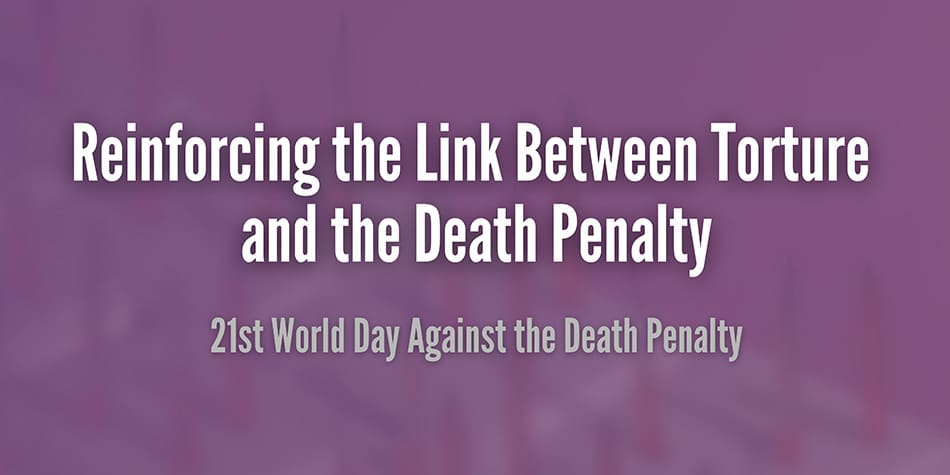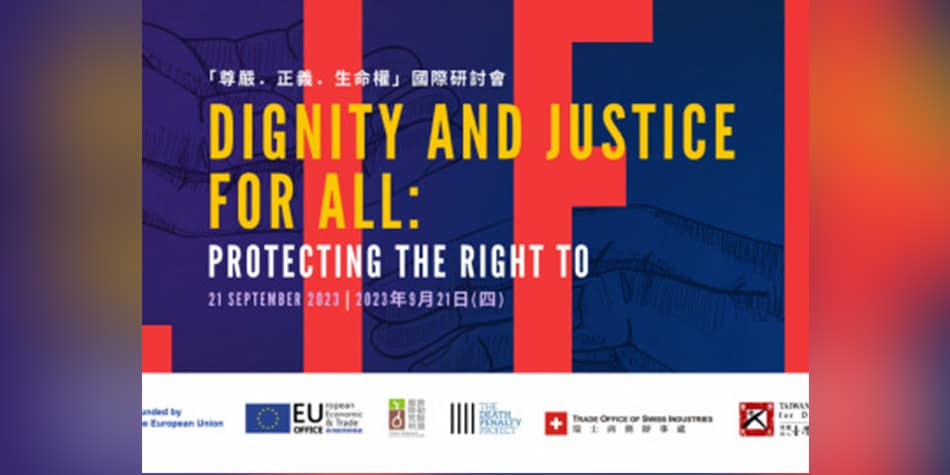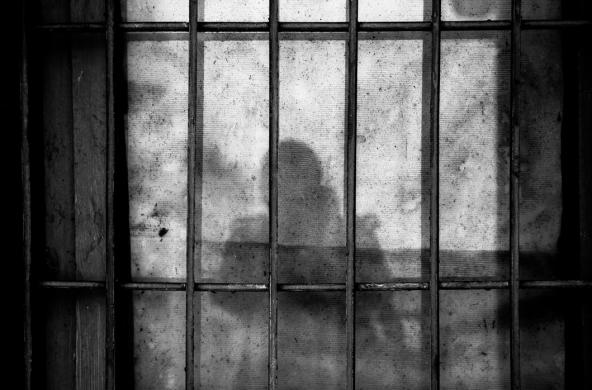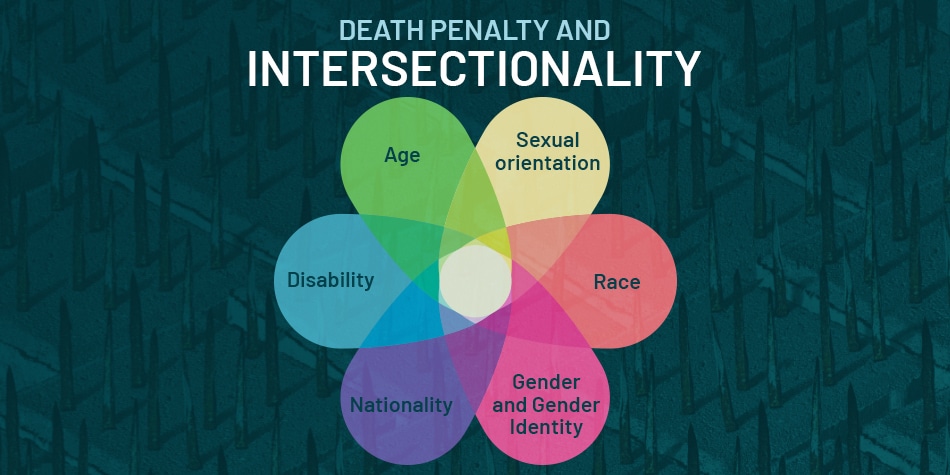
Reinforcing the Link Between Torture and the Death Penalty: 21st World Day Against the Death Penalty
World Day
“There is no way in today’s world to apply the death penalty in a legal way, in a way that does not violate international law.” This was the bold and unequivocal assertion of former UN Special Rapporteur on Torture Juan Méndez in an online discussion with UN experts and exonerees organized by the World Coalition on October 10, 2023 for the 21st World Day Against the Death Penalty (World Day).
Since World Day 2022, more and more individuals and institutions have been coming out to say the same, building an international consensus that the death penalty amounts to torture or other cruel, inhumane and degrading treatment (CIDT).
With the theme, “Death Penalty: An Irreversible Torture,” World Day 2023 aimed to consolidate the link between torture and the use of the death penalty. From highlighting legal developments to sharing stories from death row, abolitionists from all over the world used various strategies to build on the momentum we started in 2022.
HARNESSING THE POWER OF ART FOR ABOLITION
The immersive power of theater took center stage in several 2023 World Day initiatives. Justice Project Pakistan put participants in the shoes of death row inmates with Caught!, a “theatrical escape room experience.” In the same vein, Union Chrétienne pour le Progrès et la Défense des droits de l’Homme organized a one-day educational and participatory theater in Baraka/Fizi in the Democratic Republic of Congo (DRC).
As death row is a story best told by those who live it, inmates bared their hearts to the world through their art. Witness to Innocence and Ensemble Contre la Peine de Mort led “C’est la vie? Raising Awareness on Capital Punishment through Art,” a public streetside exhibition featuring the works of death row inmates outside participating European embassies in the United States. In a powerful exhibit titled “I Was a Prisoner, and You Came to Me,” Juniper Gallery in Indiana showcased the artwork of Yuri Kadamov, a Lithuanian citizen of Russian descent on death row in the United States, and explored the “spiritual cost of capital punishment.”
Films screenings also engaged viewers in a critical examination of the death penalty and its place in human stories. World Coalition members organized screenings of films like “Seven Winters in Tehran” (Kurdistan Human Rights Association-Geneva, Coalition marocaine contre la peine de mort, LE HAVRE contre la peine de mort), “Letters from Death Row” (ACAT France – Rennes Group), “Shepherds and Butchers” (Avocats Sans Frontieres France Nigeria), “Unfathomable” (Justice Project Pakistan), and “There is No Evil” (Eleos Justice).
EDUCATION FOR ABOLITION
Abolitionists made use of different media to reach out to the public and educate them on the link between torture and the death penalty. Several organizations came out on the radio to broadcast abolition, including LE HAVRE Contre la peine de mort, Amnesty International Zimbabwe, Foundation for Human Rights Initiative (Uganda), Women Aid and Criminal Justice (Tanzania), Union Chrétienne pour le Progrès et la Défense des droits de l’Homme (DRC), Observatoire Burundais des Prisons and International Commission of Jurists Kenya.
Abolitionists also engaged communities to build their capacity to advocate for abolition in their respective areas of expertise. The Anti-Death Penalty Asia Network (ADPAN) held “How to Save a Life” and trained law students on clemency procedures in Malaysia. ADPAN also trained members of the Malaysian death row family network in their first meeting with them on World Day. Young journalists from different media houses in Zimbabwe benefited from a media workshop on the death penalty delivered by Veritas Zimbabwe.In the DRC,abolitionist network members participated in a refresher workshop on thematic issues related to abolition hosted by the Réseau des Associations de Défense des droits de l’Homme et des Militants Abolitionnistes de la peine de mort (RADHOMA).
Several reports were also launched, strengthening the evidence base for abolition, including:
- “The enigma of de facto abolition: Researching the death penalty in countries which do not execute” (Death Penalty Research Unit, University of Oxford),
- “Remembering Those Who Have Been Executed” (Institute for Criminal Justice Reform),
- “The Challenging Path to Abolishing the Death Penalty” in Indonesia (KontraS),
- “Drug Executions: The Politically Costless Victims of the Death Penalty in Iran” (Iran Human Rights),
- “Annual Report on Execution in Iran 2022-2023” (Center of Statistics of Human Rights Activists in Iran), and
- “Death Penalty in Pakistan: Data Mapping Capital Punishment” (Justice Project Pakistan).
GATHERING EXPERT VOICES
In Tanzania, Tanganyika Law Society organized a National Dialogue of Experts about the Death Penalty, with the participation of legal and human rights experts, including Minister of Constitution and Law Hon. Dr. Pindi Hazara Chana, who pledged that the government would work against the death penalty.
The NETWORK for the Abolition of the Death Penalty and Cruel Punishment (REPECAP) led a petition declaring that the “abolition of the death penalty is a norm of jus cogens,” collecting the signatures of renowned jurists, human rights experts, and international law students.
Several webinars were hosted by member organizations, bringing diverse expert voices to a global platform, including “The Torture of Solitary Confinement” with UN experts and lawyers by Death Penalty Focus, “Leveraging the Convention Against Torture to Advocate for Abolition” by The Advocates for Human Rights, “The Fear of Too Much Justice” on racism and classism in the American criminal justice system by the North Carolina Coalition for Alternatives to the Death Penalty, and “Dialogue on the Right to Life: A Conversation about Harm Reduction and the War on Drugs” by the Coalition Against the Death Penalty Philippines. With the support of our members, the World Coalition also organized an online discussion on the link between torture and the death penalty with UN experts and exonerees.
MOBILIZING FAITH AGAINST THE DEATH PENALTY
World Day also brought together leaders and congregations of different faiths to mobilize against the death penalty.
In the United States, EJUSA Evangelical Network led a National Christian Prayer Call to End the Death Penalty, which aimed to “prayerfully move toward being a nation where we break cycles of violence.” Interfaith and multi-faith activities, including vigils, demonstrations and press conferences, were also organized across the nation, in Georgia, Ohio, Nevada, South Carolina, Texas, Alabama, Lousiana, Georgia, Arizona, to appeal to federal and state leaders against executions. Jewish leaders also came out against the death penalty in an online discussion organized by Missourians Against the Death Penalty (MADP) and L’Chaim! Jews Against the Death Penalty.
To promote positive interpretations of religious texts against the death penalty, Association for Democracy in the Maldives (ADM) released public awareness materials on the application of the death penalty and Islamic teachings on Qisas, with a focus on educating families of victims on the benefits of not choosing the death sentence as a form of justice.
TAKING THE FIGHT ONLINE
Finally, messages for abolition filled social media as abolitionists released communication materials utilizing different media and platforms. From October 12 to 17, #NoDeathPenalty, World Day Against the Death Penalty and other related phrases and hashtags reached over 42,600 mentions and engagements on different platforms, including 37,600 posts and engagements on Twitter/X. Demonstrating the global and multilingual reach of the campaign, advocacy messages were expressed in different languages, with the top being English (47%), Farsi (14.7%), French (9.3%) and Arabic (5.5%).
Amplifying the voices of individuals, organizations released videos of citizens expressing their personal opposition to the death penalty, including Coalition tunisienne contre la peine de mort and Transformative Justice Collective Singapore. Some also shared the messages of allies in positions of power, such as the video features of ADPAN and The Death Penalty Project. Riding on the recent announcement of Narges Mohammadi’s Nobel Peace Prize win, Abdorrahman Boroumand Center for Human Rights in Iran reshared her video message on how the international community can help Iranians in their fight against capital punishment.
Savvy of the language of social media, abolitionist shared advocacy messages on different platforms. Legal and Human Rights Centre Tanzania used social media cards to highlight recent developments in African jurisprudence on the death penalty. Allies from feminist and queer movements, including Women Beyond Walls, ILGA Asia and NCRI Women’s Committee, highlighted the link between gender-based discrimination and the death penalty. Abolitionist countries, such as Australia, Belgium, Canada, Spain and Switzerland, also used the social media accounts of their embassies around the world to reassert their firm position against the death penalty.







